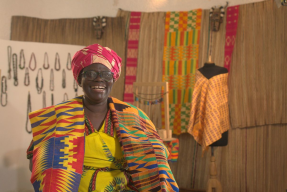by Gustavo Visalli, KF14, Guatemala
Commutes are a part of life. In college I lived in a town with more bikes than people, so I had a relaxing bike ride to class every day. Back home in San Francisco I had the pleasure of reading about my World Series Champion Giants on the train to work. Easy transport increases our range. This allows us to access more resources with little effort (even those of us without cars).
Daily travel is not so simple here in Guatemala. It is a significant barrier for many looking for access to resources such as food markets or financial services. To keep microfinance accessible to the rural communities, MFIs like ASDIR must travel to the client for visits and loan interviews. Fellow KF14 member Nila’s breakdown of one MFI expenses show that staff travel expense is second only to staff salaries. That’s a lot of client visits!
Allow me to illustrate the difficulty of car-less travel here in Guatemala by giving a taste of my evening commute:
First is the Sardine Act: the microbus to the main road. At a $0.12 fare, drivers will pack in as many passengers as is illegally allowable. In a 10 seat minivan, I have counted an estimated 22 high school kids and one full sized Gustavo. It is not uncommon for us to spill out onto the top and side steps of the van. On a road full of mostly ignored speed bumps, this makes for a very interesting ride.
Next comes the highway shoulder hike, which I briefly mention in my previous post. This is pretty self-explanatory. As you can see, there isn’t much of a shoulder. I have found that pickup trucks in particular are not shy about keeping things uncomfortably close.
After a hike through the nightly market in town, it’s time for the main event:
“El Carnicero” is the final boss. I call it the butcher because I pass the municipal slaughterhouse before facing this monster hill. Elder Guatemalan women seem to be able to conquer this beast on a daily basis without losing too much breath. My sea-level lungs are not quite at that point.
Medium distance travel is a burden for many rural residents in Guatemala. It often takes hours and is rarely as comfortable as a cushioned train seat. This limits many residents to the shops, services, and resources of their surrounding area. Limited resources equals limited development, which is something ASDIR and other social organizations are working to change here.
As for my daily commute: bring on the carnicero. I’ll be back on the train reading about the Giants soon enough.
Gustavo is a Kiva Fellow working with Asociación ASDIR in Nimasac, Guatemala. Check out the brand new ASDIR Lending Team on the Kiva website.
PREVIOUS ARTICLE
Mountains Beyond Mountains: The Landscape of Microfinance in Nepal →NEXT ARTICLE
Cindy’s Baptism by Onions →

















